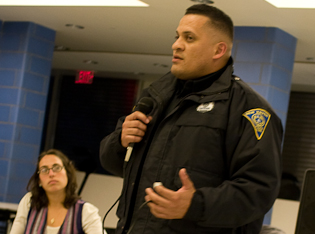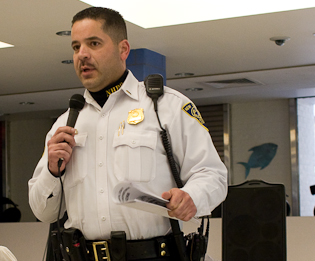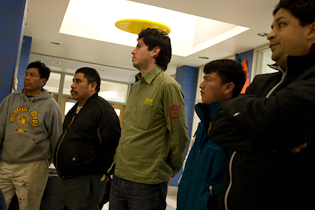 Looking out at nearly 100 Fair Haven Latinos, Officer Diego Quintero delivered a message from the New Haven’s police department, “We’re simply here to help you … We’re not here to report you to immigration.”
Looking out at nearly 100 Fair Haven Latinos, Officer Diego Quintero delivered a message from the New Haven’s police department, “We’re simply here to help you … We’re not here to report you to immigration.”
Colombian-born Quintero (pictured) was a featured speaker at a Wednesday evening meeting between Latinos and cops in Fair Haven. The event, organized by the NHPD and two local Latino organizations, was designed to foster dialogue between Fair Haven’s immigrant population and the local police.
The police department’s General Order 06 – 2, which prohibits officers from asking anyone about his or her immigration status, forms a foundation for such dialogue. Officials put that policy into place to encourage immigrants to come forward with information about crimes.
Quintero and his supervisors, Lt. Luiz Casanova and Captain Denise Blanchard, wanted to remind Fair Haven residents about the 2006 order, so that undocumented immigrants will come forward to talk about crimes they have either witnessed or suffered personally, without fear that they will be deported.
The meeting also provided an opportunity for local residents to talk directly with the police about some of the issues that they’ve had with the department, including unresponsive officers and even alleged physical abuse.
 The theme that emerged from the meeting was communication. Again and again, Officer Quintero and Lieutenant Casanova (pictured) stressed the importance of immigrants talking to neighborhood police officers and keeping lines of communication open.
The theme that emerged from the meeting was communication. Again and again, Officer Quintero and Lieutenant Casanova (pictured) stressed the importance of immigrants talking to neighborhood police officers and keeping lines of communication open.
Fear not!
Just before 7 p.m., the basement cafeteria at the Fair Haven Middle School on Grand Avenue was filled with dozens of adults seated at kid-sized lunchroom tables. Spanish language copies of General Order 06 – 2 were handed out and the meeting began.
“It’s important that criminal acts get reported. That’s the basic reason for this order,” Quintero said, in Spanish. “Victims of crimes should not be afraid to go to the police.”
If crimes go unreported, Quintero said, problems will only get worse. Crime reports become statistics which decide where police officers are deployed, Quintero explained. If crime isn’t reported in an area, the supervisor is going to think there aren’t any problems there, and deploy his officers accordingly.
In addition to urging residents to communicate with the police, Quintero also encouraged Fair Haveners to get Elm City ID Cards. “The ID simply confirms that we are dealing with someone who really lives in our community,” Quintero said.
Quintero concluded his remarks with a reminder to be respectful of the law and of police officers. Speaking as a Latino immigrant himself, Quintero said, “If we want to be respected and supported in this country, we need to observe the laws that exist here.”
 One of the first to approach the mic during the meeting’s question and answer period was Abel Sanchez (second from right in photo), a landscaper from Guatemala who has been in the U.S. for 10 years. In Spanish, Sanchez told the officers how he had allegedly been beaten and wrongfully arrested by a New Haven police officer.
One of the first to approach the mic during the meeting’s question and answer period was Abel Sanchez (second from right in photo), a landscaper from Guatemala who has been in the U.S. for 10 years. In Spanish, Sanchez told the officers how he had allegedly been beaten and wrongfully arrested by a New Haven police officer.
Quintero declined to comment on the specifics of the Sanchez’s situation, but explained that “in cases like this there is a process.” He told Sanchez how to make a formal complaint at the police station, which will lead to an internal investigation.
A man named Javier stepped forward to explain that he had been struck by a bottle thrown by teenagers on Ferry Street recently. He said that he immediately approached a police officer and was ignored and denied assistance.
“If a police officer doesn’t help you, ask another,” Quintero told him. Go to the police station, call the police department, he said.
Several others had concerns to share, and Quintero and Casanova’s advice followed familiar lines: communicate with the police, follow up on your complaints, use the processes that are in place.
“I want to thank everyone for coming out,” Casanova said at the end of the meeting. “We shouldn’t always have to wait to vent our frustrations at these meetings.” He encouraged people to attend the monthly Fair Haven community management team meetings.
After the meeting Sanchez described his perception of the relationship between immigrants and cops in Fair Haven. “There’s a lot of fear. Many people don’t have confidence in the police,” he said. Nevertheless, Sanchez said that he was less afraid than before the meeting, and was grateful to now know how to complain about police abuse, should he ever need to do so again.
East Haven?
There was almost no mention Wednesday night of recent recent news of alleged police harassment of Latinos in next-door East Haven.
The one reference to East Haven came when Ana Winn, head of the Office of New Haven Residents, addressed the group. After explaining how to get an Elm City ID Card, Winn told the group what to do if an out-of-town cop damages the card. Mentioning the East Haven Police Department by name, Winn said that if a cop damages your ID, you should make sure to get his name and badge number and report the incident to her office.
After the meeting, New Haven Community Services Director Kica Matos explained that in the past five months there have been “four or five” complaints that East Haven police officers have punched holes in Elm City IDs after pulling New Haveners over. East Haven Latino business owners Luis Rodriguez and Nardo Marin have made similar allegations. Matos said that she has one of the damaged cards in her office.
Matos said that in response to the allegations, the head of the New Haven Office of Vital Statistics and Mayor John DeStefano had both called East Haven Police Chief Len Gallo, who reportedly said that he would look into the matter. Since those January phone calls, Matos said, no more incidents have been reported.